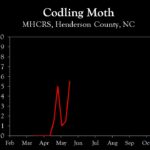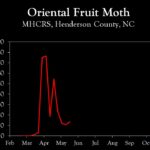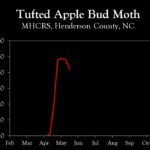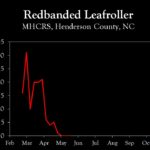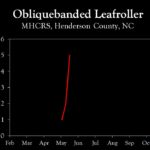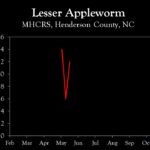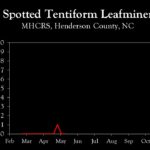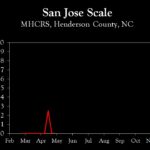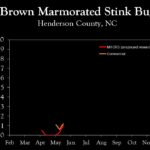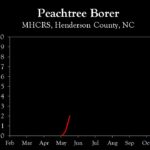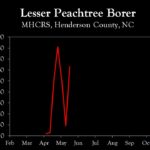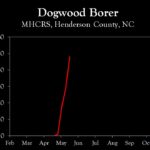WNC Orchard Insect Pest Populations – May 19, 2025
go.ncsu.edu/readext?1073431
en Español / em Português
El inglés es el idioma de control de esta página. En la medida en que haya algún conflicto entre la traducción al inglés y la traducción, el inglés prevalece.
Al hacer clic en el enlace de traducción se activa un servicio de traducción gratuito para convertir la página al español. Al igual que con cualquier traducción por Internet, la conversión no es sensible al contexto y puede que no traduzca el texto en su significado original. NC State Extension no garantiza la exactitud del texto traducido. Por favor, tenga en cuenta que algunas aplicaciones y/o servicios pueden no funcionar como se espera cuando se traducen.
Português
Inglês é o idioma de controle desta página. Na medida que haja algum conflito entre o texto original em Inglês e a tradução, o Inglês prevalece.
Ao clicar no link de tradução, um serviço gratuito de tradução será ativado para converter a página para o Português. Como em qualquer tradução pela internet, a conversão não é sensivel ao contexto e pode não ocorrer a tradução para o significado orginal. O serviço de Extensão da Carolina do Norte (NC State Extension) não garante a exatidão do texto traduzido. Por favor, observe que algumas funções ou serviços podem não funcionar como esperado após a tradução.
English
English is the controlling language of this page. To the extent there is any conflict between the English text and the translation, English controls.
Clicking on the translation link activates a free translation service to convert the page to Spanish. As with any Internet translation, the conversion is not context-sensitive and may not translate the text to its original meaning. NC State Extension does not guarantee the accuracy of the translated text. Please note that some applications and/or services may not function as expected when translated.
Collapse ▲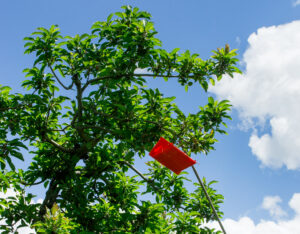 Codling moth degree-day accumulations range from about 370 in Henderson County (2100 ft) to about 600 in the lower elevation of Cleveland County (about 900 ft). This represents peak activity throughout the region, so if not using pheromone traps to monitor populations, one should assume a damaging population exists and a codling moth recommended insecticide should be applied if one has not been made in the past 10 to 14 days. (See the table of codling moth insecticide efficacy.)
Codling moth degree-day accumulations range from about 370 in Henderson County (2100 ft) to about 600 in the lower elevation of Cleveland County (about 900 ft). This represents peak activity throughout the region, so if not using pheromone traps to monitor populations, one should assume a damaging population exists and a codling moth recommended insecticide should be applied if one has not been made in the past 10 to 14 days. (See the table of codling moth insecticide efficacy.)
Tufted apple bud moth (TABM) degree-day accumulations are currently about 775 DD in Cleveland County. A single application of either Altacor, Exirel, Verdepryn, Delegate, or Intrepid applied between about 700 to 1200 DD will provide excellent season-long control of TABM. Degree-days in Henderson County are only at about 656, so waiting until the next or following week to apply an insecticide targeting this pest would be ideal.
TABM is a leafroller that was once a major pest in many production areas in the southeast, but since registration of Intrepid in the early 2000s, along with Altacor and Delegate in 2008, it has become a minor pest. However, it continues to be captured in pheromone traps, and when insecticides are not applied, damage has been observed later in the season.
Learn more about southeastern apple insect pests at the Apple Insect Management page.
2025 Average Weekly Trap Captures
| HENDERSON COUNTY | |||
| Insects per trap | |||
| May 5 | May 12 | May 19 | |
| Codling moth | 1.0 | 1.5 | 5.5 |
| Oriental fruit moth | 12.0 | 12.0 | 13.5 |
| Tufted apple bud moth | 49.0 | 49.0 | 42.0 |
| Redbanded leafroller | 0.0 | 0.0 | 0.0 |
| Obliquebanded leafroller | 1.0 | 1.0 | 5.0 |
| Lesser appleworm | 14.0 | 14.0 | 12.0 |
| Apple maggot (research orchards) | n/a | n/a | set |
| Apple maggot (abandoned orchard) | n/a | n/a | n/a |
| Brown marmorated stink bug (commercial) | 1.1 | 0.6 | n/a |
| Brown marmorated stink bug (unsprayed research orchard) | 0.0 | 0.3 | 1.0 |
| Spotted tentiform leafminer | 0.0 | 0.0 | 0.0 |
| Dogwood borer | 18.0 | 29.0 | 48.0 |
| Peachtree borer | 0.0 | 0.5 | 2.0 |
| Lesser peachtree borer | 49.5 | 9.0 | 63.0 |
| San Jose scale | 0.0 | 0.0 | 1.7 |
*Note that these averages illustrate only the timing of insect emergence and fluctuations in populations, and are not representative of population levels in any given orchard. The only way to have an accurate assessment of an individual orchard’s populations is to set up traps in that orchard.
2025 Accumulated Degree Days
| HENDERSON COUNTY | ||||
| May 5 | May 12 | May 19 | ||
| Codling moth (Biofix: April 21) | 202 | 263 | 391 | |
| Oriental fruit moth (Biofix: March 17) | 666 | 757 | 920 | |
| Tufted apple bud moth (Biofix: April 14) | 343 | 435 | 598 | |



